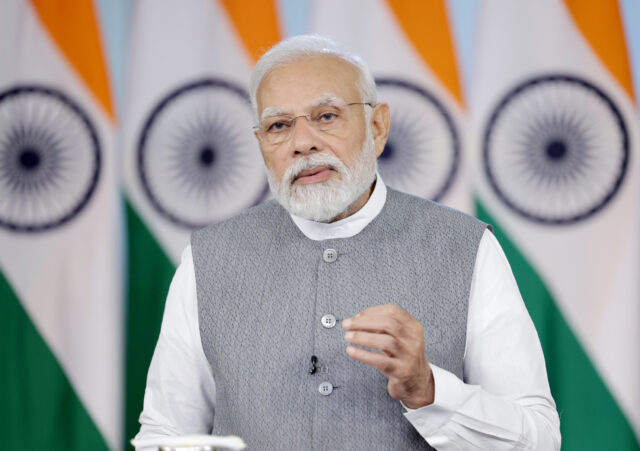Prime Minister Narendra Modi’s Act East policy now in its tenth year has earned a good report card from foreign policy experts and academicians.
The Act East Policy (AEP) unveiled by Prime Minister Modi at the ninth East Asia Summit in Myanmar in 2014, is a successor to India’s Look East Policy.
Experts say that the AEP, one of the foreign policy cornerstones of the Modi government, has strengthened India’s diplomatic outreach but its potential must be optimized.
They are optimistic that the next decade of Act East Policy will be crucial for India to demonstrate its leadership
Foreign policy experts and academicians evaluated ten years of the policy at a recent discussion organized by the Delhi based Observer Research Foundation.
Rahul Mishra, Associate Professor in School of International Studies, JNU observed good change is happening but not everything that has happened in Look East Policy is good.
He said that initiatives need to be followed up to optimize the Look East Policy.
Professor Mishra drew attention to a clear shift from institution building to policy making.
He said that all these years, India has tried to focus on institution building efforts but now there is a new found focus on policy initiatives.
He cited the example of Indo Pacific Oceans Initiative for which India has been pushing for membership.
The JNU Professor said that from being relied upon for defence repair and refurbishing from 1992 to 2014, India is emerging as a defence exporting country.
“Another development is India’s interest in building and upgrading ports. India has done this in South Asia but this is going to Southeast Asia.’’
“The focus on mini-lateral and trilateral strategic initiatives are working as gadgets to fill the gaps in AEP and wider Indo Pacific engagement, ‘’ said Professor Mishra.
He said that India is now seen as being very mindful and calculative in its approach.
He added, “A lot of progress has been made in India’s northeastern States and that gives us a ray of hope.’’
He further recommended that India readjust its priorities while engaging with ASEAN as a grouping and member countries of Southeast Asia.
Don McLain Gill, Lecturer, Department of International Studies and De La Salle University, Manila, said, “ The AEP has significantly indicated India’s willingness to effectively position itself in a highly dynamic geo-political landscape of the Western Pacific.’’
Enumerating other takeaways of the Act East Policy, Don mentioned that there is clearer recognition and acceptance of India as a rising great power.
“ India was able to leverage the rise of the Indo Pacific construct.”
He added that Southeast Asian countries now see India as an immediate neighbour.
“Initially in 2014, India’s Act East policy gave mixed signals, said Don.
He added, “As the Modi government continued to operationalize the AEP, many southeast Asian states realized that India is here to stay.”
‘’This created openness in working in sensitive areas of cooperation in which India was not necessarily involved in the national security calculations of many southeast Asian countries.’’
Pratnashree Basu, Associate Fellow ORF and CNED said that the AEP has strengthened India’s diplomatic oureach and influenced India’s engagement with the Indo Pacific region.
“ In the last ten years, India has deepened its engagement with ASEAN and India’s diplomatic visibility has also risen,’’ said Pratnashree.
She added that the AEP has fortified India’s position as a regional player committed to stability and economic growth.
“ The AEP has adopted a more strategically focused approach that includes security cooperation, regional connectivity and deeper institutional ties with ASEAN and other East Asian nations.’’
She said that the domestic turmoil in Bangladesh and Myanmar, both crucial for regional connectivity projects, has delayed some progress.
Yanitha Meena Louis, Analyst, Institute of Strategic & International Studies (ISIS), Malaysia said that the AEP has shown remarkable flexibility and adaptability.
“The emergence of the Info Pacific order demanded that the AEP be recalibrated.’’
She said that India has shown that the policy is malleable and responsive to its policy framework.
Ambassador Ajay Bisaria, Distinguished Fellow, ORF who moderated the discussion, sought a balance sheet of negatives and positive on the AEP from the panelists.
While some panelists suggested that India could informally create an informal coalition of willing partners within ASEAN.
While Professor Mishra said defence cooperation, greater role in building maritime infrastructure and inbound flow of tourists, creating supply change resilence, use of AI, is the way forward.
Don McLain said that there must be some sort of mechanism to include India in minilaterals in southeast Asia.
Pratnashree suggested greater combination of triangular cooperation for development, could be useful.
Yanitha Meena Louis prescribed that perception building is very important for India in Southeast Asia.
“Southeast Asia needs to realize that India is here to stay.’’
Ambassador Bisaria said that the decade gone by has seen many outcomes but the policy needs course correction.
Delhi based journalist pickled in journalism. Have reported from nine world capitals and almost all parts of India. Over the last three decades, I have worked for India’s mainstream English dailies and contributed to All India Radio, Doordarshan and Women’s Feature Service. Also worked for international media including Japan’s leading newspaper, The Asahi Shimbun and done assignments for The Sunday Times, London, The Telegraph, The Guardian and the Canadian Broadcasting Corporation. Worked in the Embassy of France in New Delhi and can speak French to save my life. Write on Diplomacy, Politics and the social sector. Love Nature, heritage, Nature, animals and vintage cars. Enjoy cycling and playing badminton.





